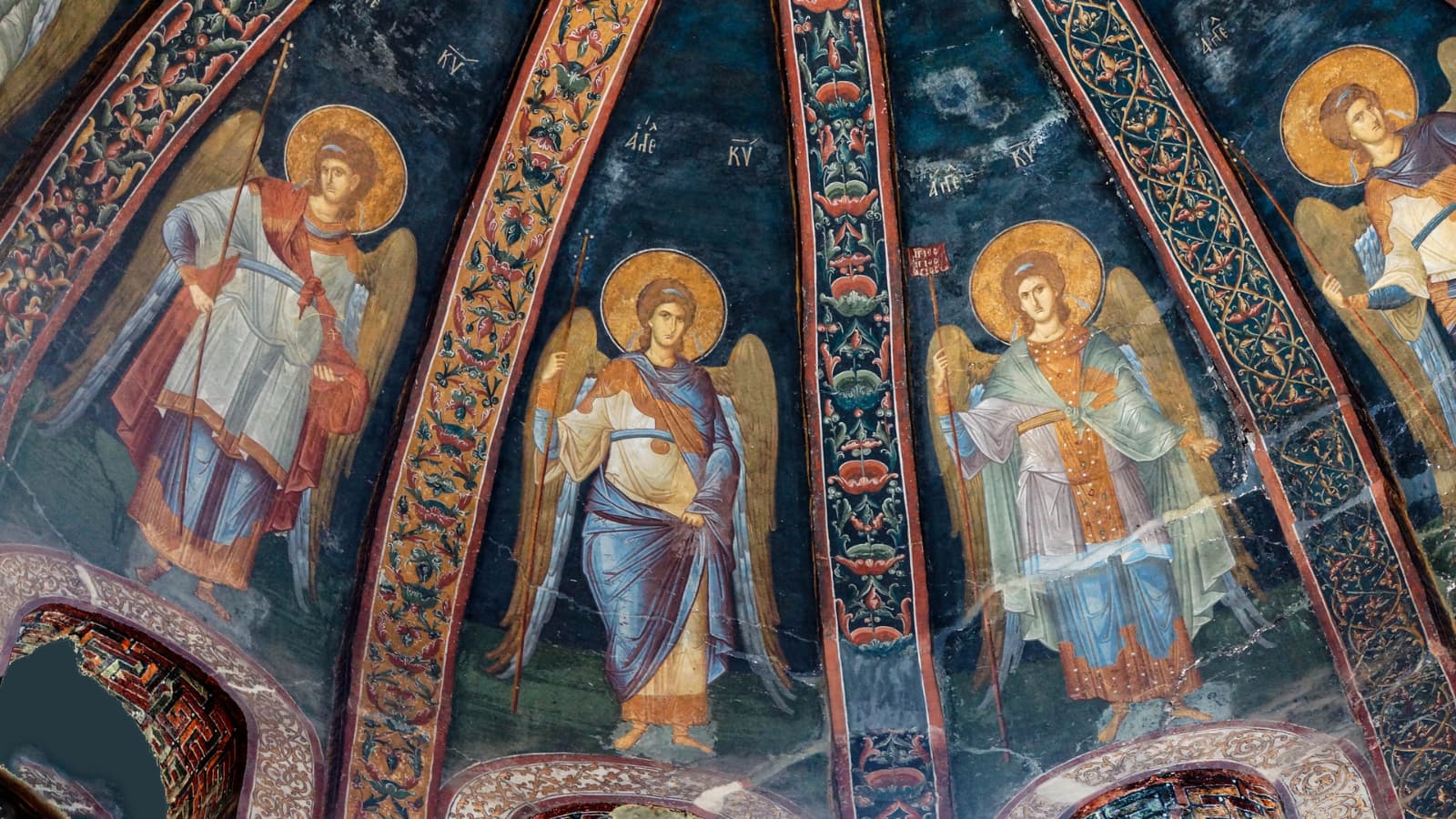In Eastern Orthodox theology, angels are not only divine messengers but also devoted servants of God, each with unique roles and responsibilities that reflect the intricate design of creation. Moreover, the hierarchy of angels, which is deeply rooted in Scripture and the wisdom of the Church Fathers, offers a window into the majestic order of the heavenly realm and God’s profound plan for humanity. In this post, we will explore the nine ranks of angels, organized into three triads.
The First Triad: Seraphim, Cherubim, and Thrones
1. Seraphim
At the top of the hierarchy, we encounter the Seraphim, ethereal beings with six wings (Isaiah 6:2-3). Often depicted in icons as radiant figures wreathed in flames, their name is derived from a Hebrew word meaning “to burn.” These angels perpetually surround the throne of the Almighty, singing of His boundless holiness. Their resplendent voices echo through the heavens as they declare, “Holy, Holy, Holy,” which serves as a testament to their unwavering devotion and the depths of divine love they embody.
2. Cherubim
Secondly, we have the Cherubim, who are commonly portrayed with multiple wings and enigmatic faces. Not only do they hold divine wisdom and secrets, but they also play a crucial role in Sacred Scripture. For example, Cherubim guard sacred spaces, such as the entrance to Eden and the Ark of the Covenant (Genesis 3:24; Exodus 25:18-22). Consequently, they remind humanity of the sanctity of God’s presence. Their role is not merely protective; rather, they inspire awe and reverence, inviting us to explore the depths of truth and beauty hidden in creation.
3. Thrones
Next, the Thrones represent the majestic footstool of God’s holy kingdom, embodying divine justice and authority (Colossians 1:16). These angels serve as instruments of God’s will, administering His governance throughout the cosmos with grace and righteousness. Furthermore, their presence radiates an aura of stability, emphasizing the profound moral order that God establishes. Thus, they remind us that even in a chaotic world, there is a divine purpose guiding all of history toward its ultimate fulfillment.
The Second Triad: Dominions, Virtues, and Powers
4. Dominions
Occupying a critical leadership role, the Dominions (Ephesians 1:21) are responsible for overseeing the lower choirs of angels while ensuring the fulfillment of God’s divine will. These regal beings radiate authority and organize the celestial hierarchy. In doing so, they direct angelic ministries with wisdom and strength. As a result, they sustain the rhythm of divine activity, guiding the chorus of their heavenly brethren in the harmonious execution of God’s plan.
5. Virtues
In addition, the Virtues are the bearers of divine grace, intimately connected with the miraculous and the natural order. They govern the laws of nature, imbuing creation with beauty and purpose (1 Peter 2:9). These angels inspire humanity toward virtue and holiness, encouraging acts of goodness and compassion in a world often fraught with challenges. Ultimately, their influence serves as a reminder that every act of kindness and courage resonates in the divine cosmos, revealing the light of God even amidst darkness.
6. Powers
The Powers are formidable warrior angels engaged in the spiritual battle against the forces of darkness (Ephesians 6:12). Charged with protecting humanity from evil influences, they embody strength and vigilance. They have the power to repulse the temptations demons bring upon us and protect us from spiritual harm. In their divine mission, they stand as champions of God’s righteous order, reaffirming the hope that goodness ultimately prevails. Thus, their presence in our lives serves as a reminder that we are never alone in our struggles against temptation and despair.
The Third Triad: Principalities, Archangels, and Angels
7. Principalities
At the top of the third triad, Principalities are entrusted with overseeing nations and guiding the destinies of communities (Colossians 1:16). These angels are deeply involved in the affairs of humanity, aligning earthly leaders with divine purpose. Consequently, their solemn charge reflects God’s desire for justice, peace, and harmony among nations. They act as the unseen forces working to inspire unity and righteousness, ensuring that societal structures resonate with God’s kingdom.
8. Archangels
The Archangels occupy a significant and revered place within the nine ranks of angels. Figures such as Michael, Gabriel, and Raphael serve as the principal messengers of God. They herald divine revelations and guide pivotal moments in salvation history. For instance, Archangel Michael stands as a defender against evil (Revelation 12:7-9). Moreover, Archangel Gabriel brings good tidings to the Theotokos (Luke 1:26-38). And Archangel Raphael embodies healing and guidance in our journeys (Tobit 12:15). Through their powerful intercession and presence, they illuminate our path, reminding us of God’s unwavering love and concern.
9. Angels
Lastly, at the foundation of the hierarchy, we find the Angels. The Angels serve as personal guardians to each individual (Psalm 91:11-12). God created these gentle, loving beings to accompany us from our first breath, guiding, protecting, and interceding on our behalf. Their presence is a constant reassurance that we are enveloped in divine care, reflecting the nurturing heart of God. In the stillness of prayer, one may sense the whisper of their encouragement, urging us to remain steadfast in faith and hope.
Conclusion
In conclusion, the intricate tapestry of the nine ranks of angels provides a rich understanding of the spiritual dimension in Orthodoxy. These celestial beings not only highlight the order of creation but also reveal the depths of God’s love and purpose for humanity. Through their diverse roles and responsibilities, they invite us to engage more profoundly with our faith and the divine mystery that surrounds us.
Read More: Why Orthodox Christians “Pray To” Saints

